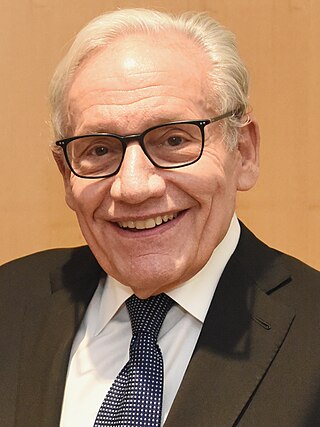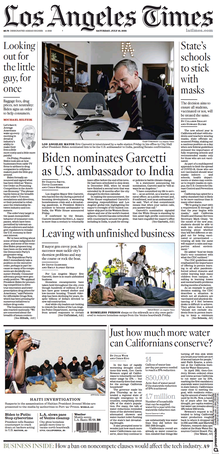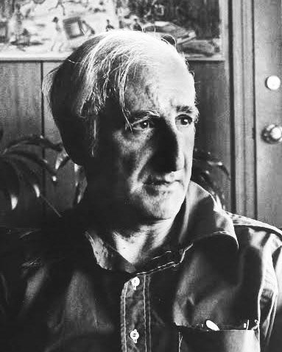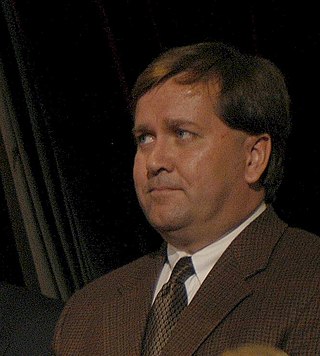Related Research Articles

United Press International (UPI) is an American international news agency whose newswires, photo, news film, and audio services provided news material to thousands of newspapers, magazines, radio and television stations for most of the 20th century until its eventual decline beginning in the early 1980s. At its peak, it had more than 6,000 media subscribers. Since the first of several sales and staff cutbacks in 1982, and the 1999 sale of its broadcast client list to its main U.S. rival, the Associated Press, UPI has concentrated on smaller information-market niches.

Thomas Kennerly Wolfe Jr. was an American author and journalist widely known for his association with New Journalism, a style of news writing and journalism developed in the 1960s and 1970s that incorporated literary techniques. Much of Wolfe's work was satirical and centred on the counterculture of the 1960s and issues related to class, social status, and the lifestyles of the economic and intellectual elites of New York City.

Robert Upshur Woodward is an American investigative journalist. He started working for The Washington Post as a reporter in 1971 and now holds the title of associate editor.

The Los Angeles Times is a regional American daily newspaper that started publishing in Los Angeles, California in 1881. Based in the Greater Los Angeles area city of El Segundo since 2018, it is the sixth-largest newspaper by circulation in the United States, as well as the largest newspaper in the western United States. Owned by Patrick Soon-Shiong and published by California Times, the paper has won more than 40 Pulitzer Prizes.

Sports journalism is a form of writing that reports on matters pertaining to sporting topics and competitions. Sports journalism has its roots in coverage of horse racing and boxing in the early 1800s, mainly targeted towards elites, and into the 1900s transitioned into an integral part of the news business with newspapers having dedicated sports sections. The increased popularity of sports amongst the middle and lower class led to the more coverage of sports content in publications. The appetite for sports resulted in sports-only media such as Sports Illustrated and ESPN. There are many different forms of sports journalism, ranging from play-by-play and game recaps to analysis and investigative journalism on important developments in the sport. Technology and the internet age has massively changed the sports journalism space as it is struggling with the same problems that the broader category of print journalism is struggling with, mainly not being able to cover costs due to falling subscriptions. New forms of internet blogging and tweeting in the current millennium have pushed the boundaries of sports journalism.

Ben-hur Haig Bagdikian was an American journalist, news media critic and commentator, and university professor. An Armenian genocide survivor, he moved to the United States as an infant and began a journalism career after serving in World War II. He worked as a local reporter, investigative journalist and foreign correspondent for The Providence Journal. During his time there, Bagdikian won a Peabody Award and a Pulitzer Prize. In 1971, he received parts of the Pentagon Papers from Daniel Ellsberg and successfully persuaded The Washington Post to publish them despite objections and threats from the Richard Nixon administration. He later taught at the University of California, Berkeley Graduate School of Journalism and served as its dean from 1985 to 1988.
In journalism, a source is a person, publication, or knowledge of other record or document that gives timely information. Outside journalism, sources are sometimes known as "news sources". Examples of sources include but are not limited to official records, publications or broadcasts, officials in government or business, organizations or corporations, witnesses of crime, accidents or other events, and people involved with or affected by a news event or issue.
Journalistic ethics and standards comprise principles of ethics and good practice applicable to journalists. This subset of media ethics is known as journalism's professional "code of ethics" and the "canons of journalism". The basic codes and canons commonly appear in statements by professional journalism associations and individual print, broadcast, and online news organizations.

Ronald Borek Kessler is an American journalist and author of 21 non-fiction books about the White House, U.S. Secret Service, FBI, and CIA.
The byline on a newspaper or magazine article gives the name of the writer of the article. Bylines are commonly placed between the headline and the text of the article, although some magazines place bylines at the bottom of the page to leave more room for graphical elements around the headline.
Claims of media bias generally focus on the idea of media outlets reporting news in a way that seems partisan. Other claims argue that outlets sometimes sacrifice objectivity in pursuit of growth or profits.

Charlie Savage is an American author and newspaper reporter with The New York Times. In 2007, when employed by The Boston Globe, he was a recipient of the Pulitzer Prize. He writes about national security legal policy, including presidential power, surveillance, drone strikes, torture, secrecy, leak investigations, military commissions, war powers, and the U.S. war on terrorism prison at Guantanamo Bay, Cuba.

Benjamin Domenech is the Editor at Large of The Spectator World. He is also a television commentator, radio host, and publisher of The Transom, a daily subscription newsletter for political insiders. In 2013, he co-founded The Federalist, where he served as publisher and hosted The Federalist Radio Hour. He also co-founded the RedState group blog. He joined Fox News as a commentator in 2021.
Walter Haskell Pincus is an American national security journalist. He reported for The Washington Post until the end of 2015. He has won several prizes including a Polk Award in 1977, a television Emmy in 1981, and shared a 2002 Pulitzer Prize for National Reporting with five other Washington Post reporters, and the 2010 Arthur Ross Media Award from the American Academy for Diplomacy. Since 2003, he has taught at Stanford University's Stanford in Washington program.

FDD's Long War Journal (LWJ) is an American news website, also described as a blog, which reports on the War on terror. The site is operated by Public Multimedia Incorporated (PMI), a non-profit media organization established in 2007. PMI is run by Paul Hanusz and Bill Roggio. Roggio is the managing editor of the journal and Thomas Joscelyn is senior editor. The site is a project of the Foundation for Defense of Democracies, where both Roggio and Joscelyn are senior fellows.

David Barstow is an American journalist and professor. While a reporter at The New York Times from 1999 to 2019, Barstow was awarded, individually or jointly, four Pulitzer Prizes, becoming the first reporter in the history of the Pulitzers to be awarded this many. In 2019, Barstow joined the faculty of the UC Berkeley Graduate School of Journalism as a professor of investigative journalism.
Beginning in 1978, for more than two decades, Ron Paul – American physician, libertarian activist, congressman, and presidential candidate – published a variety of political and investment-oriented newsletters bearing his name. The content of some newsletters, which were widely deemed racist, was a source of controversy during his 1996 congressional campaign and his 2008 and 2012 presidential campaigns.
The Washington Free Beacon is an American conservative political journalism website launched in 2012.
Steven D. Cuozzo is an American writer, newspaper editor, restaurant critic, real estate columnist, and op-ed contributor for the New York Post.
Maura Louise Judkis is an American journalist and writer. She has received recognition as a humorist, essayist, food taster, and video presenter. Since 2011, she has written for the Washington Post and is a general assignment reporter for the paper's style section.
References
- ↑ (12 February 1976). Reporters At Post Bar Use of Bylines, The New York Times (reporting on 1976 byline strike at the New York Post )
- ↑ (17 June 2004). What's the Point of a Byline Strike?, Slate
- ↑ Ritea, Steve (March 2003). The Protest That Knows No Name Archived 2013-06-12 at the Wayback Machine , American Journalism Review
- ↑ (16 December 2008). AP reporters, photographers stage 'byline strike', Agence France-Presse
- ↑ (10 July 1987). At Washington Post, Byline Strike Goes On, The New York Times (reporting that the Washington Post was not running opinion articles "because Post editors decided it was not possible to run analysis or opinion pieces without identifying the author")
- ↑ Hamilton, John Maxwell. Journalism's Roving Eye: A History of American Foreign Reporting, p. 225-26 (2009)